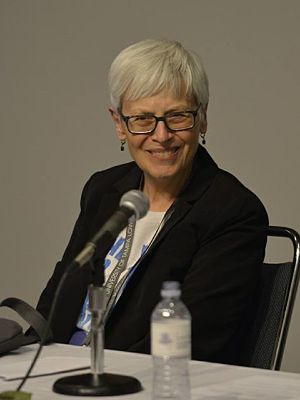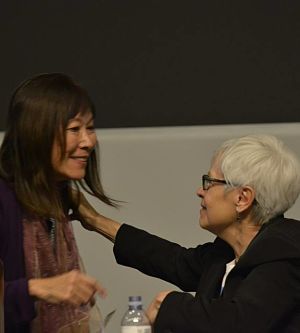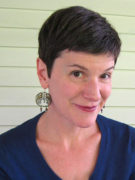A Little Poetry Machine Among Them: Seeing Eloise Klein Healy
Eloise Klein Healy is a poet and the Founding Chair and Distinguished Professor of Creative Writing Emerita at the Antioch University Los Angeles (AULA) MFA program. Eloise has written eight books, and been a literary beacon as editor, educator, mentor, LGBTQ advocate, and feminist pioneer. In 2012, Eloise was appointed first Poet Laureate of Los Angeles. Her resonant poetry, mentorship, and advocacy have fed writers and readers in Southern California and beyond. In addition to Antioch, Eloise has taught at Immaculate Heart College, The Women’s Building, and California State University Northridge. Arktoi Books, an imprint of Red Hen Press, was established in 2006 by Eloise to publish literary works of high quality by lesbian writers. Eloise is the 2016 recipient of the Publishing Triangle’s Bill Whitehead Award for Lifetime Achievement. As poet Celeste Gainey said in a recent email, “2016 is the year of EKH!”
GRAPPLING AND SELF-DOUBT (or: WRITING ABOUT ELOISE)
It’s unnerving to write about a writer, specifically, unnerving to write about someone as radiant as the iconic Eloise Klein Healy. How to capture in words the splendor of her spirit, the music of her voice? Her impish, powerful engagement with the world? But considering her work ethic, here Eloise might advise me: debunk whatever self-doubt you—as non-poet writing about poet, for instance—knock against. Leave that empty carton by the side of the highway. Let it drift off to wherever the trash belongs. It does you no good.
* * *
Eloise described this view on her work ethic in a Rumpus interview on March 23, 2013 with Wendy Ortiz, writer and author of the memoir Excavation. In speaking about an office space that she was offered as LA’s first Poet Laureate, at the LA Central Library or Mayor’s office, Eloise says, “I asked instead that I be able to get a meeting room, in case I need to meet with a group. I am working the street a bit, stopping people, telling them I’m Poet Laureate, and talking a little about poetry. The grocery store is a great place for this, as is the gas station, my tai chi class, and all the places I go where people don’t know by looking that I am a little poetry machine among them. Being Poet Laureate gives me permission to be a troubadour of sorts and that makes it more fun for all of us. I am leaning toward the fun side for people. There is wisdom in fun.”
* * *
There is wisdom in fun. A tribute celebrating Eloise and her work was held in Los Angeles on April 1, 2016 at the Association of Writers and Writing Programs (AWP) Conference. The tribute was created by poets Robin Becker, Peggy Shumaker, Alicia Ostriker, Amy Uyematsu, and facilitated by Celeste Gainey. Many gathered to revel in Eloise’s poetry, mentorship, and advocacy, after which Eloise shared her work. The room was alive. It was a well-deserved lovefest for EKH.
* * *
And the lovefest was not recorded, which makes it feel even more sacred and magical. (Maybe it didn’t happen; maybe it was just a wonderful dream.) As I grapple for imagery, the firefly comes to mind. (Just thinking about metaphors and Eloise in the same breath is daunting. For, as poet Alicia Ostriker said at the tribute, Eloise, “is such a good metaphorician.”)
* * *
Firefly or California highway headlights, it’s impossible for me to write about Eloise without invoking glow: her smile, her spark, and her aliveness; she shines light into places we humans sometimes choose to ignore; her visage and what’s behind it define the word radiant.
HINTS FROM ELOISE
When I was in graduate school, Eloise talked about revision, what to do with beloved lines of poetry that don’t fit or don’t work. I recall her saying she keeps a jar to hold those scraps of paper, those darlings, rather than throwing them away. I do this with my prose: cut and paste bits I love but can’t use into a fragments file, rather than deleting them. There is something important about honoring these pieces, something about preserving them, even if I never need them again, or they have no use. Whenever I do this (often!) I think of Eloise.
* * *
And Eloise first introduced me to the notion of using formal poetry (was it a sestina?) to contain the uncontainable. (If I were a poet, I’d remember which form she described.) I share this idea with my students: sometimes a tight form is called for: ten paragraphs, a list, a limited number of words. A constraint can help when we feel hesitant to approach what seems too sprawling and messy. You have a shape and you have to write. I can see the element of puzzle—the artful caging of what’s wild—in the work of writing formal poetry. I imagine Eloise delighting in that part of the work.
* * *
On the other hand, from the Rumpus interview, on her writing process and maybe about containing vs. not containing, Eloise said: “Always I started in long hand and think, for the most part, that I really favor writing by hand on unlined paper or graph paper. Something about lines confines my imagination or forces me into ‘direct rationality.’”
HOW IT IS NOW
Because everything circles back to me, at AWP I wondered if Eloise would recognize me. Between 1999 and 2001, I attended the Antioch Los Angeles MFA program, where Eloise was the founding chair and inspirational core. I hadn’t seen her since 2007. In April 2013, Eloise experienced a very serious case of encephalitis. In the aftermath came aphasia, which affects a person’s relationship to speech and language (as Eloise said at a Red Hen reading on February 3, 2015, “Some other parts of me started to say things,” and later in a poem, she describes “flipping on the flying words.”). From that illness Eloise made a superhuman recovery, but brains being what they are, I wasn’t sure, just didn’t know whether she would know me. (She did. I attribute this more to her strength and recovery than to my singular importance.) As it has always been, at AWP her presence was the best kind of sunshine, all the glow, none of the UV danger. And her relationship with language continues to amaze me.
* * *
In a 2014 LA Times article, “Eloise Klein Healy finds poetry in her recovery from encephalitis,” Patt Morrison writes:
Here is Healy talking about her roller coaster: ‘Since I had the real spookiness, I did have slips about normal things. Even sometimes with a certain proposal, I think I’m going to say something but I can’t, so I have to back up and call it something else. It was a different reality.’ Her mind still crafts and shapes phrases, as she realizes, but differently: ‘The way things are now, I’m in a little bit of what you might call a mess…. I have the parts that are complete, like all of us, but now I know there are parts of us that have thoughts, we can’t say them, like people standing outside a house and they can’t leave a message. I say something about things that do not speak to me as they used to. I’m an old poet—I can say silly things.’
* * *
After a grief like this, there’s a need to knit stories and make meaning—about what the health crisis did to the poet, to the poetry. I try to name in metaphor the scaffolding that emerged from underneath Eloise’s living and work. A scaffolding that, maybe without the crisis, we never would have glimpsed. The access we have, now, to Eloise’s expression of her humanity is a power tool in cutting through artifice. The word “authentic” has been used until all meaning is wrung out. But this is my experience of seeing Eloise now: In a process that seems like poetry itself, the spark that has emerged in her new relationship to language is closer to real, is a thing pared down to what’s alive underneath any word. Is a music, a distillation that can describe, without effort, what is lit behind a thing like beauty.
* * *
The poet is still there, she’s like a poem stripped of everything inessential, a poem shining through; she’s been through so much that we can’t know or imagine (or maybe we can only imagine) and now radiates unfettered access to the heart of what it is to be alive. Such triumph. It seems now she has entry to the hidden core of language, that which is connected to the body, the mother ship, the helix of the heartbeat. Layers have fallen away. What I observed is the triumph of what counts. It’s like her heart is closer to the outside. As I watched Eloise smiling beside her friends and colleagues at the AWP tribute, I spied her wings emerging from behind her black blazer: silver, huge, glorious, the wings of a poet.
* * *
Or, as poet Peggy Shumaker put it at the AWP tribute, “The way that Eloise loves things returns the world to intimacy.”
* * *
[Some fragmentary impressions:
the pared down, the bones of the architecture of language, the access increased the lessening
of bullshit or artifice while still having the architecture…
what’s beating under language, under one layer of layered language, the feeling beneath
the craft…
the beat of heart and what IS there vs. what is not there, the presence vs. the absence…
the tree with its leaves becoming superfluous, its superfluous leaves superfluous to the tree…
the line drawing seems more enduring than its decoration, not that the decoration
wasn’t enduring, but what’s underneath, what’s obscured by the more straightforward
and mundane humanity, it’s what’s beneath that endures…
A heart reaches out through the ribcage to meet another.]
* * *
“Maybe it’s in my office,” Eloise says at the tribute, and laughs, when she cannot find the piece of paper she needs, and goes from podium to table to look in her book bag. (Although, also, this seems like something Eloise might have said Before.)
* * *
This distillation of a poet down to her essence seems, itself, poetic, although I’m sure the humans involved (Eloise, her beloved partner Colleen Rooney, and everyone else) would not have wanted this (the huge THIS which has a Before and an After, and brought us to this moment).
Boil the bones and you get the rich broth; take the bones and hold them to the light and see them gleam, mineral, elemental, eternal. Here you find what was always here, named by poet Amy Uyematsu: “Eloise Kind Healy.”
* * *
The first time I traveled through Italy to Greece, I became sated with the over-rich decoration of Italy. When I got to Greece, I was relieved to find art stripped down to the origins, the bones. Without distraction, there is a reaching of human heart to human heart that (to me) seems more bona fide.
* * *
Or grapple for another metaphor, one of Eloise’s favorites: Baseball, specifically, I see a diagram of a baseball diamond, its direction, its wind.
* * *
Or: When the leaves fall off, you can see the tree’s architecture, its dreaming, the dreaming mind of the architect.
* * *
Or best yet: quote Eloise, in her own words. At a Red Hen Press reading at Armory Center for the Arts, Pasadena, on 2/3/15, Eloise read a new poem, “Talk of the Darkest.” She said the poem had “only been out since February 3rd. So here we are, I guess that’s pretty close!” Here’s the poem (with my presumptive, heard line breaks, transcribed from the youtube video):
Just talk of the darkest/probably similar to my hand/or somebody to remember/not any gravity anymore who wants me to memorize/the love which is a small picture. Somebody has/and I’ve watched her color and a shape, the idea I’m waiting for/and not just thinking I am. My trouble to learn/what love spent or wasted a time/before my long pity. /I wish I could feel again/just care/just plainly.
MORE ADORATION
At the Antioch Los Angeles MFA graduation on June 23, 2002, Eloise’s colleague and friend Tara Ison read a message from Sharman Apt Russell, which has stuck with me ever since, because it captures so well the essence of Eloise. In Sharman’s words, “Not many people know that Eloise wears an invisible wreath of jasmine, tiger lily, and hibiscus.” (Sharman saw the laurels long before the Laureate.) When Tara introduced the Laureate for Eloise’s recent Publishing Triangle’s Bill Whitehead Award for Lifetime Achievement, she said that the Antioch MFA program, which Eloise founded, had the “unofficial motto…Your story is worth telling. We are here to help you tell your story.” (This aligns with my experience of the program, and with what I intend to carry forward in my work teaching. In 2007 at an AULA MFA alumni residency, about Horace Mann’s edict, “Be ashamed to die until you have won some victory for humanity,” Eloise said, “Want to win a victory for humanity? Teach composition!”) At the Publishing Triangle in 2016, Tara spoke of how much she has learned from Eloise, “about teaching, about writing, about running a writing program, about literary citizenship, about how to be not just a writer, but a person in the world. I wear an invisible bracelet that says: WWED?” Yes.
* * *
In a creative writing class I taught at Antioch College this spring, we read Eloise’s poem “My Shoes” as a prompt for students to write about shoes. Her metaphor of shoes, the poem was a doorway into their lives, how they walk the floors of their living. I think a lot about those who, through their work, grant permission. Eloise grants permission. She has been a mighty influence on my becoming serious about my writing. I think about Eloise often…when I think about sound and words and the urge to write, and the many ways that urge manifests. I think of Eloise when I think of that light. In the words of Alicia Ostriker, Eloise is “deeply wise and sane.” And again, Amy Uyematsu’s “Eloise Kind Healy.” Yes. Yes.
* * *
In his song, “Anthem,” Leonard Cohen writes, “Ring the bells that still can ring. Forget your perfect offering. There is a crack in everything. That’s how the light gets in.” Last winter I wrote these lines on the chalkboard for the students in my Antioch College creative writing class, and for some of them, I later learned, those words allowed writing to happen. Now as I approach writing about Eloise through my own self-doubt, Cohen’s song reappears.
And now, too, I think of Cohen’s song in terms of Eloise and her victories. How there is a crack in everything. How Eloise always shone, and how she still shines. How, in the simple act of seeing Eloise, the light gets in.
WORKS CITED
Gainey, Celeste. Email to the author. 3 May 2016.
Ison, Tara. “Introduction of Eloise Klein Healy.” Publishing Triangle. Tishman Auditorium of the New School. New York, NY. 21 April 2016
Lindberg, Wayne. “Eloise Klein Healy—Red Hen Press at Armory Center for the Arts.” Online video clip. Youtube. 6 April 2015. Web. 4 May 2016. (https://www.youtube.com/watch?v=nu_IGAouJTU)
Morrison, Patt. “Eloise Klein Healy finds poetry in her recovery from encephalitis.” LA Times. LA Times, 8 January 2014. Web. 4 May 2016. (http://www.latimes.com/books/jacketcopy/la-et-jc-eloise-klein-healy-20140108-story.html)
Ortiz, Wendy. “Saturday Rumpus Interview With Eloise Klein Healy.” The Rumpus. The Rumpus, 23 March 2013. Web. 4 May 2016.







